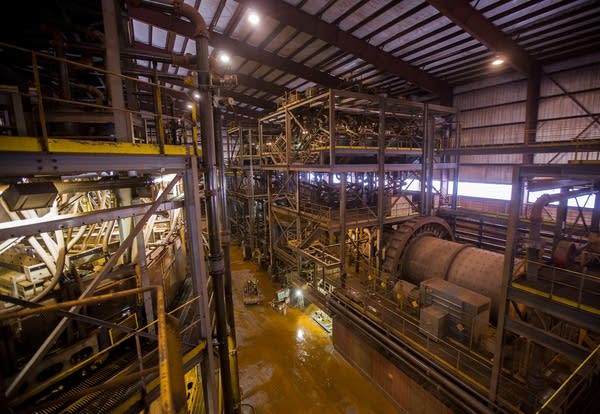Iron mining woes force Magnetation bankruptcy

Updated: 5:10 p.m. | Posted: 10:08 a.m.
Magnetation, a Grand Rapids, Minn.-based company that pioneered a new form of iron ore mining in northeast Minnesota, filed for bankruptcy Tuesday.
The company said the restructuring will allow it to keep operating during a global downturn in the iron ore industry, one that has already led to over a thousand layoffs on the Iron Range. The company intends to keep paying suppliers, vendors and employees while it works through the Chapter 11 filing.
Create a More Connected Minnesota
MPR News is your trusted resource for the news you need. With your support, MPR News brings accessible, courageous journalism and authentic conversation to everyone - free of paywalls and barriers. Your gift makes a difference.
Magnetation was born from the waste of over 100 years of iron ore mining in northern Minnesota. The company devised an innovative technology to process the tailings thrown away by old mining companies into an iron ore concentrate that can be used to make steel.
Since its founding in 2006, the company has expanded. It's built four plants on the Iron Range, plus a taconite pellet plant in Indiana.
Magnetation completed its newest and biggest plant near Grand Rapids just before the New Year. And then the global price of iron ore tumbled to record lows.
Last month the price of iron ore plunged to under $50 a ton, down from $190 in 2011. Iron ore production globally has soared, while demand, especially in China, is way down. That's led to a surge of cheap imports into the U.S., which has hurt American steelmakers.
"We're a young company without deep pockets," said President Matt Lehtinen. "We invested heavily in northern Minnesota, and the iron ore prices crashed at just the wrong time for us."
Lehtinen said the company's bankruptcy restructuring and $64 million in new capital investment from its senior bondholders will allow Magnetation to survive. The company employs about 300 people on the Iron Range.
Other Iron Range companies are feeling the effects of plunging iron ore prices. US Steel has announced about 1,100 layoffs at its two mines on the Iron Range. Magnetation closed down one of its plants this winter. And just this week, Cliffs Natural Resource announced 95 layoffs at its five mines in Minnesota and Michigan's Upper Peninsula.
DFL Sen. Majority Leader Tom Bakk said he worries that high-cost producers could be driven out business.
"This bankruptcy is just another example, I think, of the challenges that the global iron ore business is presenting to Minnesota," Bakk said. "I think we're at some risk of really a significant downsizing of Minnesota's iron ore industry."
But Matt Lehtinen, the company's president, said Magnetation is positioned well for the future. He said the company benefits from low costs, because it doesn't have to haul and crush tons of rock like conventional mines do.
College of St. Scholastica economist Tony Barrett said the bankruptcy filing isn't necessarily bad.
"I see this as a fairly natural stage of development, for a company that did expand rapidly," Barrett said. "In an industry that's under stress, those are the companies that are vulnerable — the new ones trying new technology."
But an infusion of new capital from investors, Barrett warns, usually comes with strings attached. State Rep. Tom Anzelc worries that will likely mean a loss of what makes Magnetation unique among Iron Range mining companies: local control.
"It feels to me that much of the decision making at the highest levels will not be made by Iron Range entrepreneurs, but will be made by the people that have the financial interest in this company," said Anzelc, DFL-Balsam Township.
Magnetation's largest customer, AK Steel, currently owns a 49.9 percent stake in the company. President Matt Lehtinen said the bankruptcy proceedings "may result in our current ownership structure being changed."
Economist Tony Barrett said that's the nature of the beast.
"You have a very capital intensive industry. You need that money. It's got to come from somewhere. That's outside our neighborhood," Barrett said.
Northern Minnesota legislators have introduced proposals to help with some of those high capital costs. One would lower the price for electricity and another could lower royalty payments when companies mine state-owned minerals. Neither, however, address the fluctuations in the global marketplace.